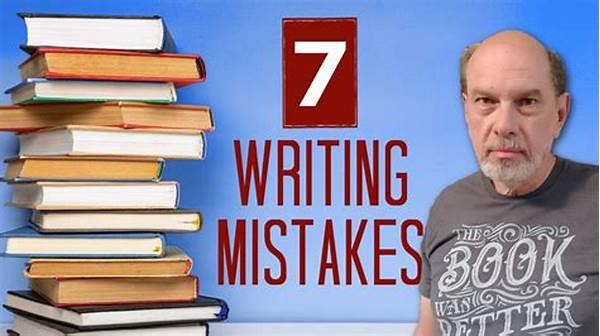Writing is a craft that demands practice, patience, and a deep understanding of language. For many, embarking on the path of authorship is a journey fraught with challenges and learning curves. Mistakes inexperienced authors often make aren’t just errors in grammar or syntax. They stem from a place of inexperience and the struggle to master the art of storytelling. Let’s dive into some common pitfalls and how they shape the narratives of budding writers.
Lack of Character Development
One of the mistakes inexperienced authors often make is neglecting character development. Characters are the heart of any story, serving as the vessel through which readers connect to the narrative. Without well-developed characters, stories often fall flat, lacking the emotional depth and relatability that captivate readers. New authors might focus excessively on plot, forgetting that it’s the characters who drive the action and shape the theme. This oversight can lead to one-dimensional characters that lack authenticity and engagement. It’s crucial for authors to breathe life into their characters, providing them with distinct voices, complex backgrounds, and genuine motivations. By doing so, the narrative becomes a rich tapestry that readers are eager to explore, enhancing their overall experience and connection to the story.
Overemphasis on Plot Twists
Plot twists can enrich a story, but one of the mistakes inexperienced authors often make is relying too heavily on them. Overusing twists in an attempt to surprise the reader can lead to a convoluted plot, diminishing the story’s coherence and flow.
Repetitive Descriptions
Another common mistake inexperienced authors often make is falling into the trap of using repetitive descriptions. This can create unnecessary fluff, bogging down the narrative and distracting from the main storyline. Variety in language is essential to maintain reader engagement.
Ignoring Pacing
Pacing is crucial in storytelling, yet one of the mistakes inexperienced authors often make is ignoring it. Too fast, and the reader may feel rushed; too slow, and they may lose interest. Striking the right balance is key to maintaining momentum and reader interest.
Neglecting Dialogue
Dialogue is often overlooked, but one of the mistakes inexperienced authors often make is crafting unrealistic or stilted conversations. Authentic dialogue not only drives the plot but also reveals character depth, making it an essential aspect of compelling storytelling.
Failure to Edit
Editing is critical, yet mistakes inexperienced authors often make include neglecting this crucial step. Failing to thoroughly revise can result in overlooked errors and a lack of cohesion in the narrative, underscoring the importance of a meticulous editing process.
Overlooking the Target Audience
Understanding who you’re writing for is paramount, yet a mistake inexperienced authors often make is overlooking their target audience. Writers may get lost in their creative process without considering the preferences and expectations of their intended readership. This oversight can lead to a disconnect between the author’s vision and the reader’s engagement level. Crafting a narrative that resonates with your audience requires a keen awareness of their interests and narrative preferences. For instance, a young adult novel needs to incorporate language, themes, and plots that appeal to a younger demographic. By aligning their storytelling approach with the expectations of their audience, authors can create more relatable and meaningful connections with their readers.
Poorly Defined Narrative Voice
Crafting a distinctive narrative voice is challenging, yet it’s a critical element of compelling storytelling. One of the mistakes inexperienced authors often make is failing to establish a consistent and engaging narrative voice. This lack of clarity can result in a jarring reading experience, leaving readers confused and disengaged. Establishing a unique voice demands attention to tone, style, and perspective. It requires authors to define who the narrator is and what emotions or attitudes they bring to the story. Whether it’s a first-person intimate tone or a third-person detached observation, the narrative voice should serve the story’s purpose and elevate the reader’s experience.
Technical Overload
One subtle mistake inexperienced authors often make is overloading their prose with technical details, believing that complexity equals sophistication. However, such excess can alienate readers, drawing them away from the essence of the narrative.
Excessive Adverbs
Using too many adverbs is a frequent mistake inexperienced authors often make, thinking it adds depth. Instead, it can clutter the prose. Opting for stronger verbs usually provides clearer imagery and enhances the narrative’s flow.
Inconsistent Tone
Another obstacle inexperienced authors face is maintaining a consistent tone throughout their work. This inconsistency can lead to a disjointed feel in the story, making it hard for readers to connect emotionally.
The Importance of Feedback
One of the valuable insights for new authors is embracing feedback. One major mistake inexperienced authors often make is ignoring or fearing constructive criticism. However, feedback is an invaluable tool for growth and improvement in writing. Engaging with workshops, writing groups, or seeking professional critiques can provide fresh perspectives and highlight areas for enhancement. By embracing feedback, authors can refine their skills and produce higher quality work. Listening to diverse viewpoints from readers or experienced writers offers insights into what works and what doesn’t, helping authors avoid entrenched habits and cultivate their unique voice.
Summary
Mistakes inexperienced authors often make are not insurmountable hurdles. Recognizing these pitfalls can lead to better storytelling and more relatable narratives. By focusing on character development, pacing, and understanding their audience, new writers can evolve and hone their craft. Embracing feedback and committing to the editing process are also crucial steps in transforming mistakes into learning opportunities, paving the way for successful writing endeavors. Ultimately, writing is an evolving journey, and every author, regardless of experience, continues to grow and learn with every word penned.
So, if you’re just stepping into the world of authorship, remember that mistakes inexperienced authors often make are part of the journey. Embrace them, learn from them, and allow them to guide you toward a more refined and authentic voice. The stories you tell will be richer, more resonant, and a true reflection of your growth as a writer.
